Plainsman and the Lady
Brief Synopsis
Cast & Crew
Joe Kane
William ["wild Bill"] Elliott
Vera Ralston
Gail Patrick
Joseph Schildkraut
Andy Clyde
Film Details
Technical Specs

Synopsis
In 1859, bank president Michael Arnesen welcomes California Senator Gwin to his home in St. Joseph, Missouri, where he is hosting a party to introduce Gwin to his business and society friends. Attending the party are Arnesen's devoted daughter Ann and his second wife Cathy, who is having an affair with Peter Marquette, the owner of an influential stagecoach line. Cathy has warned Marquette of Arnesen and Gwin's plan to start an express mail service between St. Joseph and Sacramento, which will speed communication throughout the western states, and thereby hurt Marquette's business. Cathy assures Marquette that she will do anything to help him, regardless of her husband's interests. Arnesen takes his guests to a colorful saloon owned by gambler and cattleman Sam Cotten, who has just returned from a long cattle drive. Sam is dismayed to learn that Arnesen and the "reform crowd" have cleaned up the town so that the saloon will no longer be profitable, but is delighted to meet the lovely Ann and renew his friendship with Gwin, whom he has known since his days as a trader in the West. Sam sells the saloon and accepts Gwin's offer of a job with the new mail company, which is to be called the Pony Express. Marquette is angered when the new company refuses to rent his stations, which would force them to use a longer route, but in Washington, D.C., Cathy ensures that Marquette retains the mail franchise on which the new express company had bid. Arnesen is heartbroken that they have not obtained the franchise, but Sam assures him that if they build their own stations, they will be safe from Indian attack and able to charge large sums for private letters. Sam and his pal Dringo head the group scouting for station sites, and although Marquette hires gunslinger Feisty to kill him, Sam escapes his attack and continues working. Later, all of the stations have been established and Sam returns to St. Joseph to prepare for the opening festitivies. His bumbling friend, Judge Winters, misinterprets Sam's teasing comments about selling his company stock and almost ruins Sam's romance with Ann with some unfortunate comments. Meanwhile, determined to stop the Express, Marquette urges Cathy to kill her ailing husband. That night, Cathy's lurid revelations about her affair with Marquette cause Arnesen to die from a heart attack. When Cathy takes control of the bank soon afterward, she orders that the Express payroll not be met, which means the end of the company. Sam hears of her plans, however, and threatens to reveal her infidelity if she does not get out of town immediately. Cathy storms out, leaving Marquette to stop the Express on his own. Grand celebrations are held in St. Joseph and Sacramento on the day the first riders set out, and Sam and Dringo tour the stations. They are alarmed to learn that one of the stations has been burned, and when a survivor states that Indians are responsible, Sam, who is friendly with many tribes, investigates. Horseshoe prints at the site lead Sam to believe that white men disguised as Indians are the real culprits, and he also surmises that the dead Indian found at the scene was killed in advance by the outlaws and left as "proof" of the local tribe's guilt. Sam informs the dead man's father, tribal elder Wassac, then joins Wassac for peace talks to prevent him from leading his people in a war to avenge his son's death. When another station is attacked, Sam and the Indians arrive just in time to rout the outlaws, who are working under Marquette's orders. Sam is wounded in the fracas but chases Marquette, who, before succumbing to a fatal injury, begs Sam to find Cathy, who is alone in a mountain hideout. Sam goes to the cabin, where he is once again attacked by Feisty. Sam outdraws Feisty, but Cathy is killed by a ricocheting bullet. Ann and Dringo arrive, and Ann assures Sam that she is more interested in happiness with him than in the wealth generated by the Pony Express.

Director
Joe Kane
Cast
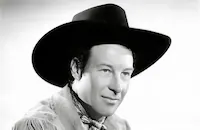
William ["wild Bill"] Elliott
Vera Ralston

Gail Patrick
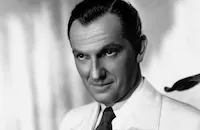
Joseph Schildkraut
Andy Clyde

Donald Barry

Raymond Walburn
Reinhold Schunzel

Russell Hicks

William B. Davidson
Paul Hurst
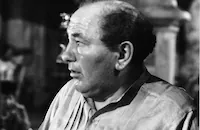
Charles Judels

Byron Foulger
Jack Lambert
Hal Taliaferro
Stuart Hamblen
Noble Johnson
Eva Puig
Lola And Fernando

Pierre Watkin
Eddy Waller
Charles Morton
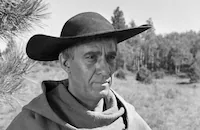
Martin Garralaga
Guy L. Beach

Joseph Crehan
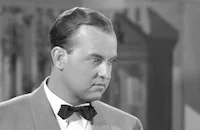
Grady Sutton
Eddie Parks
Jack Norman
Tex Terry
Chuck Roberson
Rex Lease
Henry Wills
Iron Eyes Cody
Daniel Day Tolman
David Williams
Hank Bell
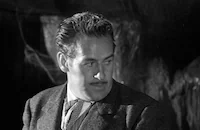
Roy Barcroft
Jack O'shea
Carl Sepulveda
Crew
Fred Allen
George Antheil
Nate Barrager
John T. Bourke
Thomas A. Carman
Gano Chittenden
Fanchon
Cy Feuer
Peggy Gray
Joe Kane
Russell Kimball
Herbert Kirkpatrick
Reggie Lanning
Howard Lydecker
Theodore Lydecker
Bob Mark
John Mccarthy Jr.
George Milo
Adele Palmer
Lewis Physioc
Gordon Schaefer
Ralph Spence
John Stransky Jr.
Richard Tyler
Michael Uris
Howard Wilson
Richard Wormser

Film Details
Technical Specs

Quotes
Trivia
Notes
The working title of this film was Glory Road. The picture is loosely based on the creation of the Pony Express, a mail service established by the firm of Russell, Majors and Waddell on April 3, 1860. Horseback riders carried mail pouches between St. Joseph, MO and Sacramento, CA, with the average ride taking thirteen days. Although stories and motion pictures about the Pony Express sometimes imply that it was a long-running service, it ended after only eighteen months of operation, in October 1861, upon the completion of the transcontinental telegraph system. The legendary status of the Pony Express is often attributed to its famous riders, which included Buffalo Bill Cody.
Although most contemporary sources list the film's running time as 87 minutes, the Daily Variety preview review gave the time as 80 minutes, and the Hollywood Reporter preview review listed it as 82 minutes. According to Hollywood Reporter news items, John Wayne was originally set to star in the film. Although a Hollywood Reporter news item includes the following actors in the cast, their appearance in the completed film has not been confirmed: Chief Tahachee, Chief Yowlachie, Many Treaties, Shooting Star and John War Eagle. A March 22, 1946 Hollywood Reporter news item stated that the film would be shot on location in Phoenix, AZ, but later Hollywood Reporter news items note that the picture was shot on location in Lone Pine, CA. Other Hollywood Reporter news items noted that background footage was shot in Monument Valley, UT and Northern Arizona. In 1954, the film was re-edited and re-released as Drumbeats Over Wyoming.












